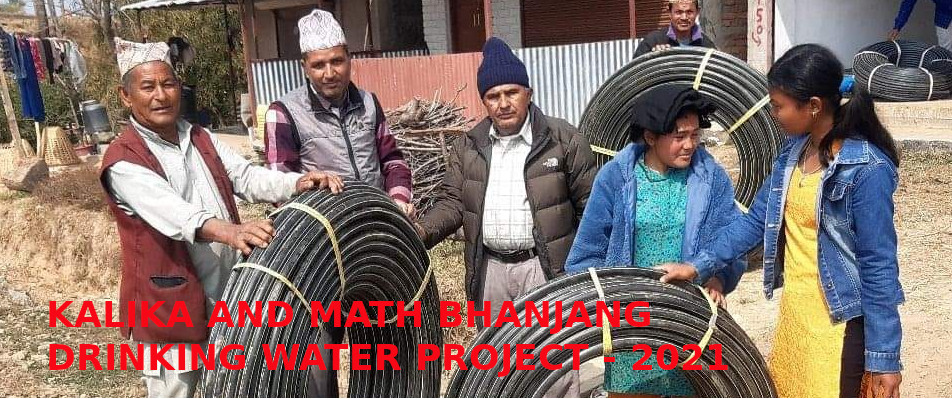OUR PROJECTS
 Delivery of water pipe to Kalika and Math Bhanjang, Nepal, 2021.
Delivery of water pipe to Kalika and Math Bhanjang, Nepal, 2021.
CURRENT PROJECTS
We believe in what we are doing and our passion is backed-up by contributions made by each of our Board Members and verifiable results. Our Board Members cover 100% of any overhead or organization administrative costs so 100% of all donations go directly towards our project efforts.2025 FINAL PROJECT
UPDATED January 10, 2025: This February we will visit Kabilash Nepal for our final project. CDWT was founded in 2017, and it grew from an earlier effort known as: Water For Small Villages, which was founded in 2012. Our team has enthusiastically undertaken (16) water projects in Haiti, Honduras, Nepal, Cuba and Madagascar and it is time for them to retire. We will sunset our organization in 2025. Please watch this space for news about a celebration party to thank all our supporters.Nepal February 2025 If you are interested in joining our final water project teams leaving for Nepal on Feb 17, 2025, let us know - fill out a Volunteer Form. We have space for (4) more volunteers wanting to see our projects up close and in-person.
LINK
COMPLETED PROJECTS
Nepal March 2021 - Kalika Drinking Water Project. LINKNepal March 2020 - COVID-19 Kabilash Foodbank Shipment. LINK
Nepal May 2019 - Nepal Water Filter Replacements . LINK
Honduras May 2019 - water system maintenance and training. LINK
Ciego de Avila, Cuba Jan 2019 3 water systems, 2 water filters LINK)
Dhokare Bari, Nepal Nov 2018 3 water systems, 30 water filters, 13 computersLINK)
San Pedro Sula, Honduras July 2018 Water filter project LINK)
Limonar, Cuba, May 2018 (3) Water filter projects LINK)
Santiago, Cuba Feb 2018 Water filter project LINK)
Aapchour, Nepal 2017 (volunteering with Water For Small Villages, Inc. ) LINK)
Kabilash, Nepal 2016 (volunteering with Water For Small Villages, Inc. ) LINK)
Madagascar 2010 Watershed project LINK)
Haiti 2009-2015 (volunteering with Water For Small Villages, Inc. )LINK)
San Pedro Sula, Honduras 2005-2017 Leading groups to Our Little Roses Orphanage LINK
PROJECTS BEING CONSIDERED
We are always ready to consider new projects. Our Clean Water Team reviews new project requests and suggestions each month. We have a method for assessing suggested projects, and a 5-step process for developing our projects. After a project is accepted we develop a detailed plan, we start our fundraising efforts, and then when the funds are available we get it done. We have no overhead costs and we have a team of volunteers ready to go, so it's just a matter of raising the funds to execute a project. Read more on How to Suggest a Project or read more about our project selection methodology.San Pedro Sula, Honduras, Cuba, Flint Michigan, USA, Puerto Rico, USA, Cape Town, South Africa, Peru, Nepal, Tolear, Madagascar, Philippines, Cape Haitian, Haiti, Mongolia, India, Tanzania
OUR PROJECT SELECTION METHODOLOGY
Our method for selecting projects is to first assess the needs of the community and assess our ability to offer a solution. If approved, It becomes an approved pending project. Once a project is approved, we incrementally adding more detail to the plan until we have a detailed assessment. The project team works remotely with the community via email, text message, or phone to discuss possible solutions and assess the community's ability to own and maintain a water system. Once we have enough details, we design a solution based on available materials, local traditions, and the most suitable technology. Finally, we put together a detailed plan and a budget. Once the funds are available (fundraising must take place), then we schedule and execute the project. We typically only do fundraising for specific projects. We only incur costs and expenses when we are executing a project, so we don't do general or non-specific fundraising for our organization. For more detail on how we assess a project read our 10-Question Project Decision Tree (pdf) .RAM PUMPS
We are always exploring technology new and old that may benefit the communities we work with. Rick built a hydraulic ram pump also known as a "water hammer". This pump uses gravity and water pressure to move water up hill. This technology is over 400 years old and there are documented pumps that have been operating for over 100 years. Basically if there is a water supply that can be directed into a pipe two opposing valves can be used to create a water hammer effect, build pressure and a ram pump can move 40% of the water 10x higher than the water source. A perfect pump can move water 20x higher. We have two working pumps we like to use in demonstrations. READ MORE about this on our ram pump page. Here are links to some Youtube videos we hope will inspire you to make your own ram pump.RAMPUMP VIDEOS
>>Rick's first ram pump
>>What size should your pressure chamber be?